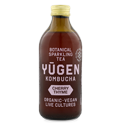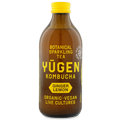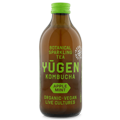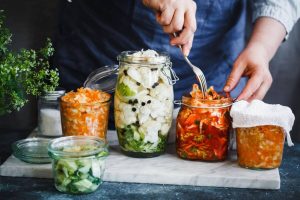
Lots and lots of articles have been written about sugar. Of all the food ingredients in the world, sugar is one of the most researched of them all. Its delicious taste makes it easy for people to crave more. But too much sugar can lead to all sorts of health issues. If kombucha is supposed to be a healthy alternative to regular soda, why is there sugar in the ingredient list? In this blogpost we will not sugarcoat the answer to this important question, let's get to it!

First of all: how much sugar does Yugen kombucha contain?
Yugen only uses organic cane sugar to ferment the tea. Cane sugar actually contains more minerals, vitamins, fibers and phytonutrients in comparison to refined white sugar.* We believe in keeping our brew as natural and unprocessed as possible. Every ingredient is as close to nature as possible, from our tealeaves and herbs, to our juices and sugar.
In total, Yugen Kombucha contains 3,8gram of sugar (or 15Kcal) per 100ml. This is leftover fermentation sugar combined with the naturally occurring fruit sugar from our juices. That's about one tablespoon of sugar per bottle or can.
Lipton Ice Tea: 8gr/100ml
Coca Cola: 10,6gr/100ml
Fritz Cola: 11gr/100ml
Minute Maid Orange Juice: 8,8gr/100ml
Red Bull: 11gr/100ml
Fever Tree Ginger Beer: 9gr/100ml
Almdudler: 7,9gr/100ml
Lemonaid Citron Vert: 6gr/100ml
Bionina Minster Lemon: 10gr/100ml
Bos Lime Ginger: 4,9gr/100ml
Little Miracles Acai: 6,1gr/100ml
Whole Earth Elderflower: 7,9gr/100ml
Why sugar?
Sugar is a basic ingredient of kombucha. The main consumers of sugar in our kombucha are the microorganisms, not us.
That’s because sugar is the prime food source for our hungry bacteria and yeast, the living organisms that make kombucha so unique. These organisms need sugar to ferment the sweetened tea into tart kombucha. In the end the left-over sugar helps to balance out the flavour or the brew.

Food for fermentation
So how does it work? We start with adding organic cane sugar to the brewed tea leaves. As soon as the tea is cooled down, we add our cultures (or scoby) to the sweet brew. First the yeast get to work. Those little creatures are sugar addicts and go through the sugar supply fast. They split the sucrose into fructose and glucose, which is then converted into alcohol and C02. Alcohol is a byproduct of their digestion. This is the cue for the bacteria to step in. They convert most of this alcohol into acetic and gluconic acid. After one month of fermentation the initial sugar content is drastically decreased and our brew tastes nicely tart and slightly sweet.

What type of sugar?
There are many sugar varieties that can be used to ferment kombucha, such as white table sugar, agave, honey, coconut palm sugar, molasses,... The one main requirement is that the sweetener source does actually contain carbohydrates. Without a carbohydrate source, the yeast and bacteria will have nothing to feed on. That's why only using stevia, or other non calorie sugar alternatives, will not work.

In comparison to sodas, our kombucha contains on average 2 to 3 times less sugar. But less sugar doesn't have to mean less complexity or depth in flavour. Thanks to our proprietary fermentation a whole array of lush fruity aromas arise from our base kombucha. This pallet is then elevated even more by a bunch of aromatic herbs and fresh juice. This way we create intense flavours without an overload of sugar, sweeteners and additives, something we're truly proud of.
Enjoy our kombucha as a treat to yourself, without the guilt that often comes with sodas. Cheers!
 I like Yugen Kombucha
I like Yugen Kombucha
 J'adore Yugen Kombucha
J'adore Yugen Kombucha






